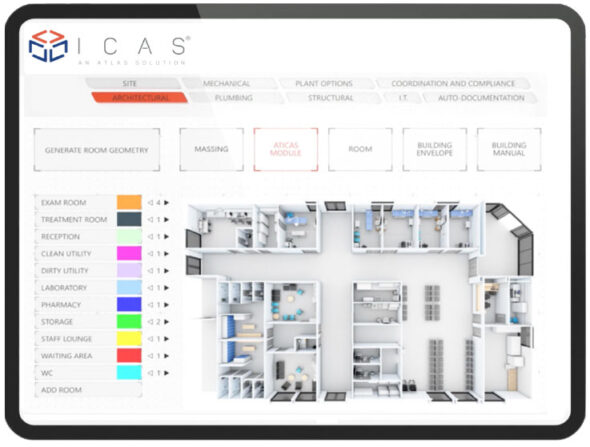London, UK-based startup Atlas is targeting the healthcare construction market with an integrated design and project delivery SaaS platform, ICAS, supporting design for manufacture and assembly (DfMA) approaches.
 Co-founded by David and Maha Harper, London-based Atlas has developed an “integrated construction and architecture platform” (ICAS) that they believe can dramatically break down silos and improve productivity when it comes to delivering healthcare facilities. Funded to date by the founders, the startup is now seeking seed funding to help it support its first client projects.
Co-founded by David and Maha Harper, London-based Atlas has developed an “integrated construction and architecture platform” (ICAS) that they believe can dramatically break down silos and improve productivity when it comes to delivering healthcare facilities. Funded to date by the founders, the startup is now seeking seed funding to help it support its first client projects.
 Atlas CEO David Harper, right, has 20 years’ experience in the healthcare construction industry as a construction project manager, having worked in building technologies for major hospitals in the UK (including Birmingham’s Queen Elizabeth Hospital) and in Qatar (including the US$7. 9 billion Sidra Medical & Research Centre). Maha Harper, below right, Atlas’s COO, is a corporate lawyer with a strong background in corporate and real estate transactions. Both are convinced that the construction sector’s poor productivity and inability to deliver complex projects on budget and on programme (with the resulting legal disputes) can be overcome.
Atlas CEO David Harper, right, has 20 years’ experience in the healthcare construction industry as a construction project manager, having worked in building technologies for major hospitals in the UK (including Birmingham’s Queen Elizabeth Hospital) and in Qatar (including the US$7. 9 billion Sidra Medical & Research Centre). Maha Harper, below right, Atlas’s COO, is a corporate lawyer with a strong background in corporate and real estate transactions. Both are convinced that the construction sector’s poor productivity and inability to deliver complex projects on budget and on programme (with the resulting legal disputes) can be overcome.
Breaking down silos
Maha Harper told Extranet Evolution that the company was inspired by work undertaken by the UN and the Gates Foundation in developing countries to deliver working hospitals and clinics. Maha Harper says:
 “One of the main issues holding the industry back is the so-called ‘silo effect’ – the linear nature of information being passed from silo to silo – plus the variety of different information formats involved. While the industry has started to move more towards digital solutions, they are mostly ‘point solutions’ which, in effect, digitises those silos. This doesn’t, effectively enough, do away with the delays and cost inefficiencies.”
“One of the main issues holding the industry back is the so-called ‘silo effect’ – the linear nature of information being passed from silo to silo – plus the variety of different information formats involved. While the industry has started to move more towards digital solutions, they are mostly ‘point solutions’ which, in effect, digitises those silos. This doesn’t, effectively enough, do away with the delays and cost inefficiencies.”
“We have talked to lots of healthcare customers and identified that we could potentially realise 20% efficiency savings by a targeted spend of 4% of the overall budget.”
She explained Atlas aimed to bridge the gaps between healthcare providers and the project delivery disciplinary silos (procurement, design, logistics), the point solutions they rely upon, and the disparate digital outputs these solutions create. Atlas, she said, was providing an integrated platform geared solely to the needs of the healthcare market, not just in developing economies but also in the US and Europe.
ICAS
 A software-as-a-Service platform, ICAS starts by defining the customer’s needs, and then developing designs to meet those needs. Maha Harper says:
A software-as-a-Service platform, ICAS starts by defining the customer’s needs, and then developing designs to meet those needs. Maha Harper says:
“You can develop the best tech in the world, but if you don’t really understand the end-user’s needs and what they will actually adopt, then you’re just developing ‘great tech’ instead of a ‘must have’ solution for customers.”
Atlas has been engaging with facility investors, healthcare owners, and operators (“Many have been discouraged by previous projects that ran late, over-budget”). The company’s ICAS solution is currently being deployed to help deliver a $100m 150-bed hospital in the Americas. Harper says the project brief was developed using artificial intelligence and generative design to create a detailed configuration of the building and its rooms and systems. This process (and the supporting data) can inform feasibility stage decisions. Then, with a clear view of the proposed design, Atlas could then engage with preferred suppliers and manufacturers to procure materials and products, aggregating them into the integrated model. As well as streamlining design and construction, the ICAS platform also provides an environment to configure devices, equipment, etc, to speed up commissioning and handover.
The ICAS platform does not replace existing design or scheduling tools such as Autodesk Revit or Oracle Primavera P6. “By bringing together project systems through APIs [application programming interfaces], ICAS can minimise the disconnects between different solutions. We are using a lot of the Oracle and Autodesk software stacks.” ICAS will also help deliver a graphical interface to healthcare and building operation systems, including a hospital user manual, HUM, to support operation and maintenance work, and an intelligent clinic operating system (ICOS) for long-term operational information (healthcare informatics is one area where data standardisation is particularly advanced).
To date, the Harpers have invested £460,000 into the Atlas business and are looking to raise £2.5m in seed funding to push the company forward. A chief technology officer is set to be appointed to help drive the company’s devops model.
The post Atlas ICAS targets healthcare market appeared first on Extranet Evolution.


















